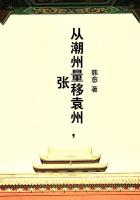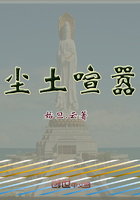It was late at night when Felipe reached San Juan Capistrano; but he could not sleep till he had seen this man. Here was the first clew he had gained. He found the man, with his wife and children, in a large corner room opening on the inner court of the Mission quadrangle. The room was dark and damp as a cellar; a fire smouldered in the enormous fireplace; a few skins and rags were piled near the hearth, and on these lay the woman, evidently ill.
The sunken tile floor was icy cold to the feet; the wind swept in at a dozen broken places in the corridor side of the wall; there was not an article of furniture. "Heavens!" thought Felipe, as he entered, "a priest of our Church take rent for such a hole as this!"
There was no light in the place, except the little which came from the fire. "I am sorry I have no candle, Senor," said the man, as he came forward. "My wife is sick, and we are very poor."
"No matter," said Felipe, his hand already at his purse. "I only want to ask you a few questions. You are from Temecula, they tell me."
"Yes, Senor," the man replied in a dogged tone,-- no man of Temecula could yet hear the word without a pang,-- "I was of Temecula."
"I want to find one Alessandro Assis who lived there. You knew him, I suppose," said Felipe, eagerly.
At this moment a brand broke in the smouldering fire, and for one second a bright blaze shot up; only for a second, then all was dark again. But the swift blaze had fallen on Felipe's face, and with a start which he could not control, but which Felipe did not see, the Indian had recognized him. "Ha, ha!" he thought to himself. "Senor Felipe Moreno, you come to the wrong house asking for news of Alessandro Assis!"
It was Antonio,-- Antonio, who had been at the Moreno sheep-shearing; Antonio, who knew even more than Carmena had known, for he knew what a marvel and miracle it seemed that the beautiful Senorita from the Moreno house should have loved Alessandro, and wedded him; and he knew that on the night she went away with him, Alessandro had lured out of the corral a beautiful horse for her to ride. Alessandro had told him all about it,-- Baba, fiery, splendid Baba, black as night, with a white star in his forehead. Saints! but it was a bold thing to do, to steal such a horse as that, with a star for a mark; and no wonder that even now, though near three years afterwards, Senor Felipe was in search of him. Of course it could be only the horse he wanted. Ha! much help might he get from Antonio!
"Yes, Senor, I knew him," he replied.
"Do you know where he is now?"
"No, Senor."
"Do you know where he went, from Temecula?"
"No, Senor."
"A woman told me he went to Monterey. I have been there looking for him."
"I heard, too, he had gone to Monterey."
"Where did you see him last?"
"In Temecula."
"Was he alone?"
"Yes, Senor."
"Did you ever hear of his being married?"
"No, Senor."
"Where are the greater part of the Temecula people now?"
"Like this, Senor," with a bitter gesture, pointing to his wife. "Most of us are beggars. A few here, a few there. Some have gone to Capitan Grande, some way down into Lower California."
Wearily Felipe continued his bootless questioning. No suspicion that the man was deceiving him crossed his mind. At last, with a sigh, he said, "I hoped to have found Alessandro by your means. I am greatly disappointed.
"I doubt not that, Senor Felipe Moreno," thought Antonio. "I am sorry, Senor," he said.
It smote his conscience when Felipe laid in his hand a generous gold-piece, and said, "Here is a bit of money for you. I am sorry to see you so poorly off."
The thanks which he spoke sounded hesitating and gruff, so remorseful did he feel. Senor Felipe had always been kind to them.
How well they had fared always in his house! It was a shame to lie to him; yet the first duty was to Alessandro. It could not be avoided. And thus a second time help drifted away from Ramona.
At Temecula, from Mrs. Hartsel, Felipe got the first true intelligence of Alessandro's movements; but at first it only confirmed his worst forebodings. Alessandro had been at Mrs.
Hartsel's house; he had been alone, and on foot; he was going to walk all the way to San Pasquale, where he had the promise of work.
How sure the kindly woman was that she was telling the exact truth. After long ransacking of her memory and comparing of events, she fixed the time so nearly to the true date, that it was to Felipe's mind a terrible corroboration of his fears. It was, he thought, about a week after Ramona's flight from home that Alessandro had appeared thus, alone, on foot, at Mrs. Hartsel's. In great destitution, she said; and she had lent him money on the expectation of selling his violin; but they had never sold it; there it was yet. And that Alessandro was dead, she had no more doubt than that she herself was alive; for else, he would have come back to pay her what he owed. The honestest fellow that ever lived, was Alessandro. Did not the Senor Moreno think so? Had he not found him so always? There were not many such Indians as Alessandro and his father. If there had been, it would have been better for their people. "If they'd all been like Alessandro, I tell you," she said, "it would have taken more than any San Diego sheriff to have put them out of their homes here."
"But what could they do to help themselves, Mrs. Hartsel?" asked Felipe. "The law was against them. We can't any of us go against that. I myself have lost half my estate in the same way."
"Well, at any rate they wouldn't have gone without fighting!" she said. "'If Alessandro had been here!' they all said."
Felipe asked to see the violin. "But that is not Alessandro's," he exclaimed. "I have seen his."
"No!" she said. "Did I say it was his? It was his father's. One of the Indians brought it in here to hide it with us at the time they were driven out. It is very old, they say, and worth a great deal of money, if you could find the right man to buy it. But he has not come along yet. He will, though. I am not a bit afraid but that we'll get our money back on it. If Alessandro was alive, he'd have been here long before this."















